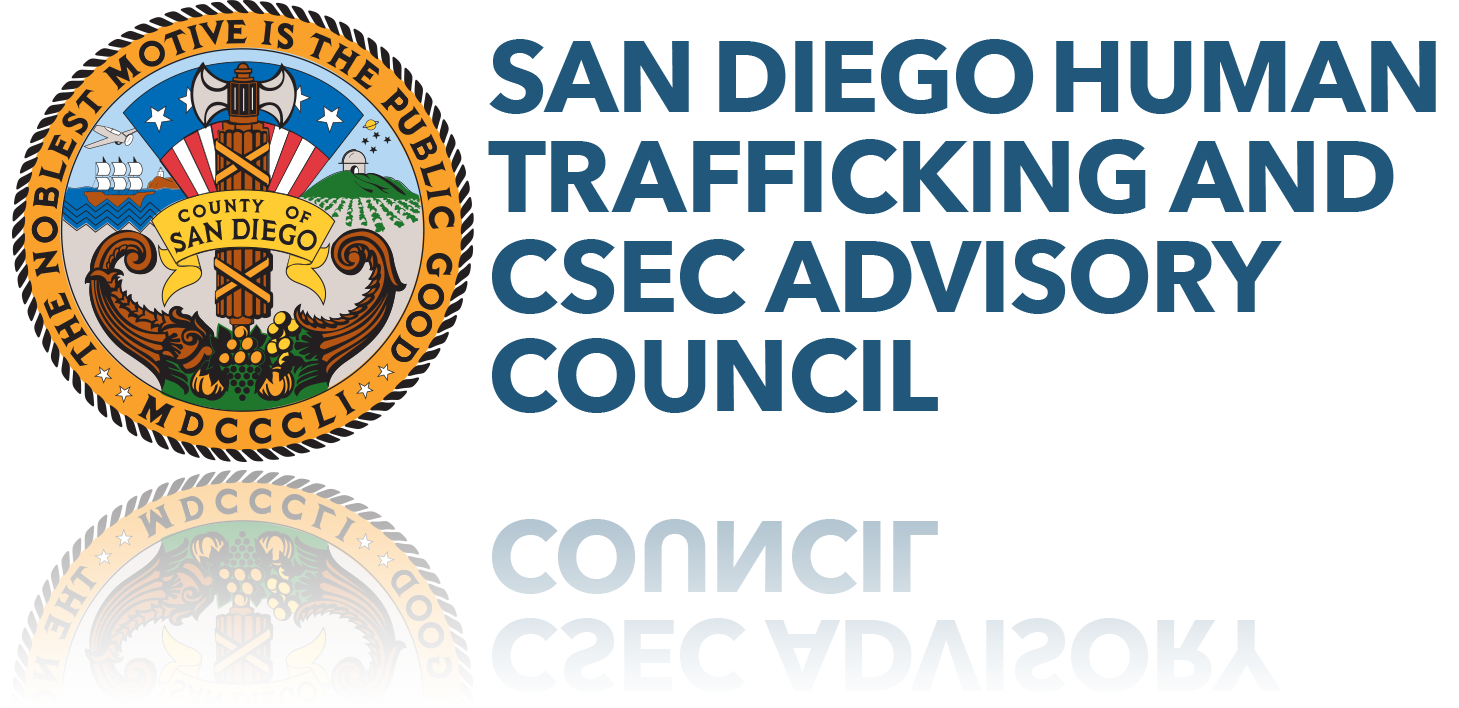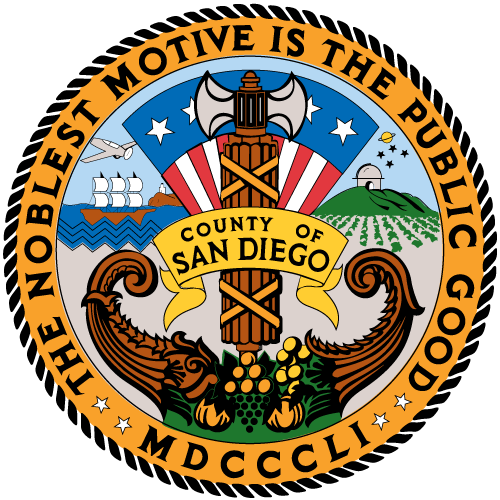By Laws
The San Diego Regional Human Trafficking & Commercial Sexual Exploitation of Children Advisory Council By-laws.
1. Jurisdiction
The San Diego Regional Human Trafficking & Commercial Sexual Exploitation of Children (CSEC) Advisory Council, hereinafter “HT Advisory Council,” was established by the San Diego County Board of Supervisors on June 14, 2011(9), to serve as a catalyst toward comprehensive, systematic change addressing human trafficking and commercial sexual exploitation of children at a countywide, interdisciplinary level. The HT Advisory Council serves the geographic region of the County of San Diego. The HT Advisory Council is an advisory committee to the Board of Supervisors.
2. Vision, Purpose, and Task
The HT Advisory Council’s vision is a united San Diego region working collaboratively to create long term, systematic change effectively addressing human trafficking and the commercial sexual exploitation of children.
The HT Advisory Council’s purpose is to provide recommendations and implementation proposals that are consistent with the charge given by the Board of Supervisors: “The goal of the Advisory Council is to implement a holistic, countywide approach integrating the Four P’s Model of the U.S. Department of Justice: Prevention, Protection, Prosecution, and Partnerships. It will focus on identifying best practices and promising trends in addressing the root causes of trafficking and exploitation, advance public policy, standardize training and protocols, and enhance victim services by creating an optimized, seamless service delivery system.”
Thus, the HT Advisory Council is tasked with identifying the best practices for combatting human trafficking and with making recommendations to the Board of Supervisors regarding countywide anti-trafficking policies.
3. Affiliation
The HT Advisory Council is not affiliated with any political group or party. The HT Advisory Council is a non-partisan, non-sectarian organization. It does not take part in, nor does it lend its influence to, any political issues.
4. Organization and Memberships
4.1 General Organizational History
The Board of Supervisors, in creating the HT Advisory Council, gave organizational responsibility to the persons, agencies, and organizations participating in anti-human trafficking efforts at the time. In a public meeting held on December 10, 2014, the initial steps toward formalization of the HT Advisory Council took place. These Bylaws reflect the further formalization of the structure of the HT Advisory Council, which is subject to the Ralph M. Brown Act (“Brown Act”- California Open Meeting Law).
In general, the HT Advisory Council has consisted of representatives from ten distinct groups representing different disciplines involved in the anti-human trafficking community that evolved over time. The groups have been and shall continue to be informally referred to as “subcommittees.” Typically, a subcommittee consists of a number of persons interested and active in that discipline’s perspective on human trafficking and child exploitation. Each subcommittee is responsible for its own organization, membership, and the selection of its representative voting members on the HT Advisory Council. The subcommittee’s names, as reflected in section 4.2 below, reflect the purpose and scope of that subcommittee.
The HT Advisory Council voting membership is structured so that no subcommittee includes a majority of the HT Advisory Council voting members. Accordingly, the subcommittees are not subject to the Brown Act.
4.2 HT Advisory Council Voting Membership
The HT Advisory Council voting membership shall consist of the Chair and Vice-Chair of the ten interest-area subcommittees, as follows:
Interest-Area Subcommittee Number of Representatives on the HT Advisory Council
Business 2
Child Welfare 2
Community 2
Education 2
Health Services 2
Law Enforcement 2
Prosecution 2
Research & Data 2
Survivor Voices 2
Victim Services 2
Biennial elections for the HT Advisory Council voting membership will take place in the subcommittees through the following process:
• Notice will be given at an HT Advisory Council meeting as to the upcoming elections
• Notice will be given to subcommittee active participants by the subcommittee’s Chair and Vice-Chair as to upcoming elections
• Protocols will be established independently amongst the subcommittees to conduct voting procedures; a vote for Chair and Vice-Chair positions will take place in each subcommittee
• At a biennial July HT Advisory Council meeting the sitting Chair and Vice-Chair of each respective subcommittee will announce their election results and the newly established voting members for each subcommittee will now form the HT Advisory Council voting membership
The HT Advisory Council establishes two-year terms for voting members.
All elected voting members will have the discretion to name a proxy of their choosing to represent them in their absence.
If a subcommittee’s Chair or Vice-Chair is unable to complete his or her term, thus creating a vacancy on the HT Advisory Council, that subcommittee will elect a new Chair or Vice Chair as soon as possible to fill the vacant position for the remaining term.
Note: The Business Subcommittee Chair and Vice Chair elections/HT Advisory Council voting representatives will follow the election process outlined in
4.2 with this initial variance:
• Representatives of the Business Subcommittee will announce the subcommittee’s election results at the October 2022 Advisory Council Meeting, and its elected Chair and Vice-Chair will then join the HT Advisory Council voting membership. The initial term will be 9 months.
4.3 Officers: HT Advisory Council Chair and Vice-Chair
The HT Advisory Council voting members shall biennially elect a Chair and Vice-Chair from the voting members of the HT Advisory Council to conduct business. This election will take place at the initial meeting after a new voting membership is established biennially. Upon a changing of the Chair, the person who served the prior term may serve one year as the Past Chair, operating within an advisory role to the Chair and Vice-Chair without a vote. In the absence of the Chair, the Vice Chair assumes the duties and responsibilities of that office. If an office is vacated, the Chair will temporarily appoint a member of the advisory committee to fill the vacancy until a new officer is elected. Such election shall be held at the next scheduled meeting following the appointment.
4.4 HT Advisory Council Non-Voting Members
All individuals with active participation (attendance at five or more meetings annually) in HT Advisory Council and/or subcommittee meetings will be deemed a non-voting member of the HT Advisory Council. Membership lists will be kept with the County-assigned coordinator and be provided upon request.
5. Meetings
The HT Advisory Council will meet a minimum of five times annually, typically on the second Wednesday of the month, at the County Administration Center, 1600 Pacific Highway, San Diego, CA 92101. A schedule identifying the specific dates, times, and locations will be adopted annually and kept with the County-assigned coordinator and be made available upon request. Additional meetings will be arranged as needed. All organized HT Advisory Council meetings will follow Brown Act requirements and be duly noticed to the membership and the public.
6. Member Voting
Each voting member of the HT Advisory Council shall have one vote.
7. Quorum and Majority Vote
7.1 A quorum is present when a majority of the HT Advisory Council voting members are present. A quorum is necessary to conduct business in the name of the HT Advisory Council.
7.2 A majority vote of the quorum present is required to pass any motion or take any official action.
8. Minutes
The HT Advisory Council shall keep written minutes of their meetings, a copy of which shall be filed with the County-assigned coordinator. It shall be the responsibility of the County-assigned coordinator to keep the minutes, file them accordingly, and make them available to the public upon request.
9. Parliamentary Authority
When not in conflict with these Bylaws all proceedings of the HT Advisory Council and any other committees established by the HT Advisory Council shall be conducted according to the rules contained in the most recent edition of Robert’s Rules of Order.
10. Compensation
Members of the HT Advisory Council and alternates shall serve without compensation except for reimbursement of approved actual and necessary travel costs, duplicating expenses, and other expenses required by the HT Advisory Council in accordance with County Administrative Code Section 472 and 484, providing funds are available for this purpose.
11. Conflict of Interest
HT Advisory Council members shall abide by all state and local laws, rules, regulations, and policies.
12. Amendments; Special Note Requirements
Amendments to these Bylaws require two HT Advisory Council meetings as follows: (1) the agenda for the first meeting will include an item allowing for discussion of proposed amendments (2) the agenda for the subsequent HT Advisory Council meeting will include an item for the proposed Bylaw amendment to be voted on. Adoption of amendments requires a two-thirds vote of the quorum present at the second meeting.
13. Spokesperson
The Chair or Vice-Chair is authorized to speak on behalf of the entire HT Advisory Council.

